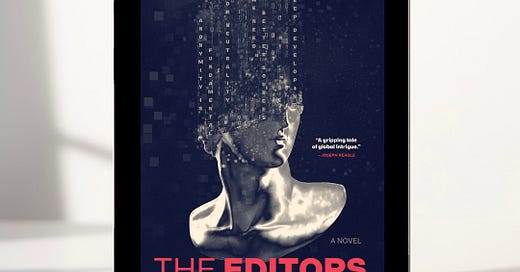I’m excited to share this sneak peak at the cover for my book, The Editors, coming this August from Inkshares.
Millions trust the online encyclopedia. But who are the people behind the facts?
It’s been a long journey to publication but the release date is finally set for August 13, 2024. Pre-order: Barnes & Noble, Bookshop, Amazon.
And now, a book I enjoyed that you might like too:
Last weekend, I had the pleasure of reading cultural and literary critic Mia Levitin’s The Future of Seduction, a short book that considers the future of dating and romantic relationships.
Levitin gives a first-person account of plunging into the world of dating apps like Tinder and Bumble in her mid-thirties. “The tools we use to meet, mate, and relate have evolved more in the past ten years than in the previous ten thousand, yet we arrive at them with a biology unchanged since the Stone Age,” she writes.
Here are some takeaways I had from the book—
· The Psychology of Texting. Levitin describes how texting induces a psychological disinhibition effect. Without immediate feedback, people on dating apps tend to be more open—showing impaired judgment, oversharing personal information, and being openly rude.
· Decision Paralysis. Dating apps like Tinder present hundreds or thousands of potential matches, leaving users overwhelmed by choices. Rather than engage in “infinite swiping,” Levitin points to research suggesting that users should stop at nine matches.
· Struggles with Distraction. One proposed explanation for the decline in romantic relationships is the rise of distractedness and increased entertainment options (i.e. “Netflix and chill”). Even the mere presence of one’s phone during a social engagement breaks the spell. “Smartphones serve as portals to elsewhere: subconscious reminders of all the other things we could be doing and people we could be with,” Levitin writes.
· The Future is Dyadic? Levitin presents research suggesting that the future of dating lies in dyadic data—that is, data collected from observing the individuals during an interaction. Rather than asking an individual to consciously evaluate how a date went, it’s likely that future dating apps will consider unconscious signals such as pupil dilation, sentence structure, and mutual laughter.
· Vulnerability Revisited. Romantic relationships require a degree of vulnerability. That’s difficult in the modern era because of uncertainty about the world and concerns about safety. Unfortunately, dating apps give us the false impression that relationships should be convenient. But as Ovid observed more than two millennia ago, “Love is no assignment for cowards.”
Would you like more of these book notes? And what do you think of the cover for The Editors? Let me know in the comments below or reply to this email.






I edit W. and there are so many adventures (good and bad) about the process. When I try to explain to friends IRL and have conversations like: FRIEND: "you looked tired today." ME: "I was up most of the night in an edit war with XmanRedux" about the basis for a scene in Hearing Secret Harmonies at the novel's Wikipedia entry." FRIEND: Eyeroll.
Looking forward to your book as a way to explain.